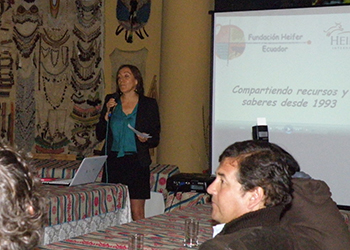
Heifer Ecuador held a "Campesino Breakfast" December 12, 2012, to highlight its work and its local partnerships. An Ecuadorian newspaper ran a story about Heifer's work in Ecuador.
Below is the translation of an article mentioning Heifer's work in el Diario El Comercio, an Ecuadorian newspaper.
Helping Farmers with Money and Manpower
Heifer International finances, advises and trains rural producers

Heifer International brings seeds, technical advice and financing; from there, the small producers of the Sierra and the Coast take over the processing and marketing. Heifer International is an international nonprofit organization that has worked in Ecuador since 1993, and its mission is to improve agricultural incomes.
"It is still believed that traditional production is not profitable, but it's the opposite," says Rosa Rodriguez, country director of Heifer Ecuador. "Sixty-four percent of the food we consume is produced by micro-producers."
"If we protect the environment using technology and not-toxic fertilizers, the production of the small agricultural area could be more profitable," she assures.
Heifer Ecuador gives a community an amount of seed capital according to its needs. This money stays in the hands of the community, and after they are able to recuperate the funds by selling their products, the money is not returned to Heifer, but rather kept in the community fund to promote future development.
With this support, campesinos are able to increase their profits by 20 percent over an average of three years, while their production grows 12 percent during the same period of time. One testimony from Marlene Fayain from the Mares y Manglares organization of Puerto Bolivar in the province El Oro reveals that with financial support from Heifer, her organization, consisting of 25 families of fishermen, was able to construct a dock.
Octavio Yunga from Canton Nabon in the province of Azuay says that members of his Wayunquita organization produced only enough vegetables for personal consumption three years ago, but now they sell their vegetables commercially.